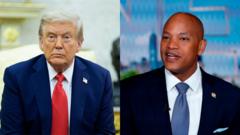In a startling escalation of rhetoric, President Donald Trump has threatened to send troops to Baltimore to assist in what he claims is a dire need to combat crime. His comments come in response to an invitation from Maryland Governor Wes Moore, a Democrat who urged Trump to walk through the city with him to better understand its challenges. Trump countered Moore's invitation by suggesting, “If Wes Moore needs help, like Gavin Newsom did in L.A., I will send in the 'troops,'” indicating a strategy that has seen National Guard personnel deployed in several Democratic-led cities.
His declaration has not sat well with Democratic officials, who are vocal critics of the president's law enforcement tactics. Moore called the president's dismissive comments about crime “tone deaf and ignorant.” He expressed concerns that Trump's approach to urban crime fails to appreciate the reality of life in Baltimore. “They have not walked our streets,” Moore pointed out, criticizing the president’s uninformed perspective.
In previous comments, Trump has defended his administration’s deployment of roughly 2,000 troops to Washington, D.C., claiming that the military presence has led to a significant decrease in crime. The Pentagon has stated that unarmed troops will soon be armed, although they have not yet been directly involved in law enforcement activities.
Despite Trump's optimistic assessments, statistics from the Metropolitan Police Department indicate notable drops in crime rates across D.C., and crime trends suggest continued improvement. Yet, the conversation around troop deployment to cities like Baltimore, New York, and Chicago has elicited severe reactions. Leaders from both Illinois and New York, alongside various Democratic officials, have labeled Trump's plans as an abuse of power and questioned his authority to intervene in local law enforcement.
A recent poll revealed that a large majority of Baltimore residents, almost 80%, oppose Trump’s plans for military intervention, viewing it as an unnecessary escalation rather than the solution to crime. With tensions mounting, the debate around the appropriateness and legitimacy of military action in domestic contexts continues to divide political lines.




















